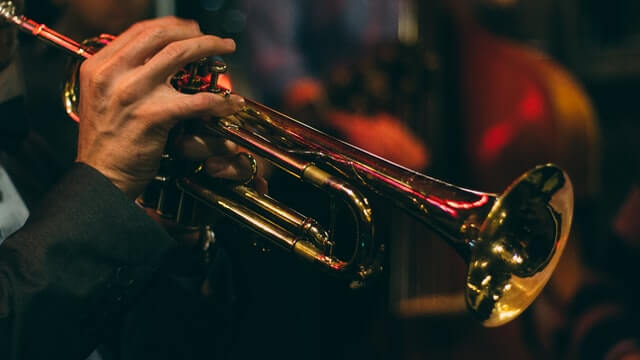Why trumpets are used in Jazz?
Like so many people you may be wondering about the reason trumpets are used in jazz ensembles. Wonder no more because in this article I will be bringing you a comprehensive reason of why trumpets are usually part of the jazz ensemble. Trumpets are used in jazz for a whole lot of reasons some of which are:
- Volume
- Sound
- Range
- Versatility
- Flexibility
- Historical reasons
These are about six reasons for which the brass instrument (the trumpets) are always used in jazz – jazz ensembles. This reasons will be well explained below.
1. Volume
The trumpet has about one hundred and fifteen decibel which has given it a loud sound, hence a high volume.
The high volume of the brass instrument makes the brass instrument (the trumpet) a spontaneous leader (and quite natural) in the jazz ensemble or jazz band section of horn. There are other instruments that also have loud volumes, but that of the trumpet supersedes all of them.
Whether the jazz ensemble is big or small, the trumpet takes charge of the band with the volume it has because even though the volume is not too loud, it is usually easier for the audience or for a listener to pick out the trumpet. More so, a trumpet player who is found in a band can also lead over the group, and the player or (the players) will have no need to get hurt as a result of stressing their lips.
On the other hand, one can get a proper volume that can fill the atmosphere with a good foundation of trumpet, and then can win larger groups or even group of players that are not quite large.
2. Sound
You may be surprised at why the volume is different from the sound here, the following lines will show you why there is such difference.
The volume talks about how the sound fills the air, how well the sound is heard, while the sound is about the music produced from the instrument. On this rests the main difference between the volume and the sound.
Trumpets are often used in the jazz ensemble, and this is largely as a result of the sound that is produced from the trumpet.
Those who play the trumpet know how to really make a sound that is bold and bright, and still is very different from the sound that is created from other brass instruments as well as instruments generally. This bright, bold and unique sound of the trumpet is a sound that is vital to the jazz music; it is so vital that it can be synonymous to the music of jazz, and other instruments used in the jazz ensemble including other instruments made of brass cannot replicate this quality of sound that the trumpet produced.
Hence, this inability from the other instruments can create such a sound which is necessary and very significant to the jazz music, sets the trumpet ahead of so many instruments as well as the players ahead in the jazz ensemble.
Although a cornet can in similitude produce a sound similar to that of the trumpet, the cornet is not common to the jazz ensemble, and so while listening to the jazz ensemble, the part of the trumpet can even make the audience synonymize the jazz ensemble with the trumpet. This one feature also sets the sound of the trumpet ahead in jazz as well as the instrument itself.
3. Range
The trumpet has various ranges, and for a fact its ranges are the highest when compared to the other instruments. This altitude of range can be likened to the different in the size of the trumpet.
So the trumpet has the potency to be higher than so many other instruments of jazz, and the trumpet players always make sure that the trumpet reaches that potency, and so when the melody is quite high as should be, it only implies that the trumpet the trumpet is playing a key role that are other instruments are not capacitated for.
For instance, a proper trumpet has ranges that extend to even C6 and produce the sound of D6, the alto saxophones can attempt to reach similar range but are only able to reach up to about A5 or Ab5 in its ranges. So still only the trumpet has this capacity.
These instruments (the trumpet and the saxophone) are able to go higher as they play in the register of altissimo, yet the trumpet still has an advantage over the saxophone, especially because the basic range of the trumpet reaches a triton or a fourth that is perfect and for a fact higher that the sax.
So whenever a composer really needs to go higher, or reach certain altitude in jazz, the composer chooses the trumpet without speculations or anytime waste.
The leader of the jazz band will also make the same choice, however it is basically not just about getting higher, of course we already see that the saxophone can attempt that too, instead it is about the sound that goes higher really. Other instruments cannot provide that same sound of the trumpet which completes and complements the jazz.
4. Versatility
Throughout the various genres of instruments, especially the ones that are used for jazz, the various types of trumpets are very versatile jazz instruments. It is versatile because this instrument is standard for various styles, including the mariachi music, the classical music, as well as the jazz music which is our focus today.
So this versatility of the trumpet makes it possible for the trumpet to be used in the different ensembles of jazz. Whether or not the whole trumpet or just its mouthpiece is swapped, one can play any kind of music, including the jazz music.
Whether it is the Latin jazz or bebop or bossa nova, there is absolutely no need to go on trying out various instruments for various groups because the versatility of the trumpet makes the trumpet very instrumental to the player for the jazz music, or for other styles of music.
5. Flexibility
Apart from the versatility of the trumpet, the trumpet is also a very flexible instrument of brass, that makes it easy for the players of the instrument to play slowly or very fast, based on what they want, the flexibility of the instrument of brass makes the difference.
Hence, this feature of flexibility that is in the trumpet makes the trumpet a very suitable instrument of brass for fast music like the upbeat tunes, and also very suitable for music that is as slow as the ballads.
Another thing about the flexibility of the trumpet especially in the jazz music is how the trumpet can assume very different positions while playing a particular song. For instance, while playing a particular song, the trumpet can just improvise within the song, the trumpet can also be used to play the solo part of the song, and the trumpet can also lead the band during that particular song.
While other instruments are capable of taking the lead, or improvising, or playing a solo, it is often very much easier for the trumpet to do so in the jazz music, as the sound of the trumpet and the range of the trumpet makes it possible and equally plausible for the trumpet to take different positions, switch through various styles and do a free style, or even play the music that is already written.
Unfortunately, the other brass instruments, or the horns that are used in the jazz find it very hard to do a few things, like being fast or being slow. To be very practical, to play a trombone quite fast will most definitely require a lot control with which it can get the right positions within a particular music.
Take for another instance, the saxophone. If one who plays the saxophone has any need to play the sax fast within a song, the player or the players as the case may be will have the need of properly coordinating the fingers of both hands, in a way that will make it convenient for the players of the saxophone.
This is never easy because of the amount of valve available to the saxophone, but the trumpet has only three valves which makes it quite easy to coordinate the fingers of the player on the brass instrument (the trumpet).
6. Techniques
Of the six reasons originally highlighted, another reason that makes the trumpet very necessary for making the jazz music is the technique that is employed by the player.
Although the instrument of brass (the trumpet) has features that are amazing, how the player puts it to use is very important because this features or the potency of the trumpet cannot be actualized by the trumpet itself, it has to be done by the player.
One of the qualities that makes the trumpet outstanding for the jazz music is its ability to growl. While the growling may not be needed in the classics, the growling is great for the jazz music especially during a solo. It may difficult in the beginning, but once the player has mastered the art, it stands out during the jamb ensemble.
Conclusion
There are other reasons which are not explained here, but it is good you discover some of them for yourself while you observe the ones we already shared here to confirm that it is true for you.
Sources
https://www.msmusic.co.uk/fp/musings/005c_musical_instruments_trumpet.html
https://www.allaboutjazz.com/the-story-of-jazz-trumpet-by-aaj-staff







